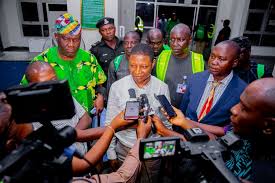A survey by the Independent Corrupt Practices and Other Related Offences Commission (ICPC) has indicated that students of tertiary institutions across the country were “dangerously exposed to corruption.”
The survey also showed that the students were also very susceptible to corruption.
Chairman of ICPC, Prof. Bolaji Owasanoye presented the survey report at the National Stakeholders’ Meeting on Nigeria Corruption Index and Presentation of Policy Brief on Eradicating Electoral Corruption.
The report is tagged “Corruption Awareness Attitude and Susceptible (CAAS) Survey of Students of Tertiary Institutions 2019.
The event was held at the commission’s headquarters, in Abuja on Tuesday.
According to Owasanoye, the survey was carried out across the six geopolitical zones.
He said that the survey indicated that the susceptibility of students to corruption was derived by synthesising the indicators for attitude toward corruption with previous personal involvement in corrupt practices.
” The indicators for attitude toward corruption include nepotism among others.”
He said that the there was the inescapable reality that students of tertiary institutions would eventually occupy the echelons of both the public and private sectors hence, the need to ensure they had the proper awareness of corruption matters.
“The attitude of future leaders toward corruption should be such that does not create room for corruption to thrive,” he said.
He also called for deliberate steps to prevent corruption and implement appropriate enforcement mechanisms.
The chairman said that the commission was collaborating with we other agencies of government to implement the findings and the outcomes of the survey.
“The findings and the outcomes could also be preventive measures that we have statutory power to focus on,” Owasanoye said.
On his part a former chairman of the commission, Mr Ekpo Nta said that government was doing substantially well in the fight against corruption.
He said that stakeholders must address the theoretical framework of corruption in order to be focused in the fight against the menace.
“This is one of the processes that anti- corruption agencies have put in place that will guide the fight corruption.”
He also called for the implementation of the National Anti-Corruption Strategy to achieve results in the war against corruption.
On his part, Mr Suleiman Suleiman, Principal Investigator on the Project, said that the objective of the of the Nigeria Corruption Index was to identify corruption hotspots and generate policy-relevant evidence.
This policy-relavant evidence, he said was for specific anti-corruption reform measures or policies.
Earlier, Provost ICPC Anti-Corruption Academy, Prof. Sola Akinrinade said that the future of long term sustainable war against corruption in the country was dependent on the emergence of policies that transcend regimes.
“The Nigeria Corruption Index and the Corruption Awareness and Sustainability Survey are all initiatives that flow from this commitment.
“By embarking upon this initiative, we seek to develop a comprehensive index that will address the complex and multidimensional nature of the problem,” Akinrinade said.



